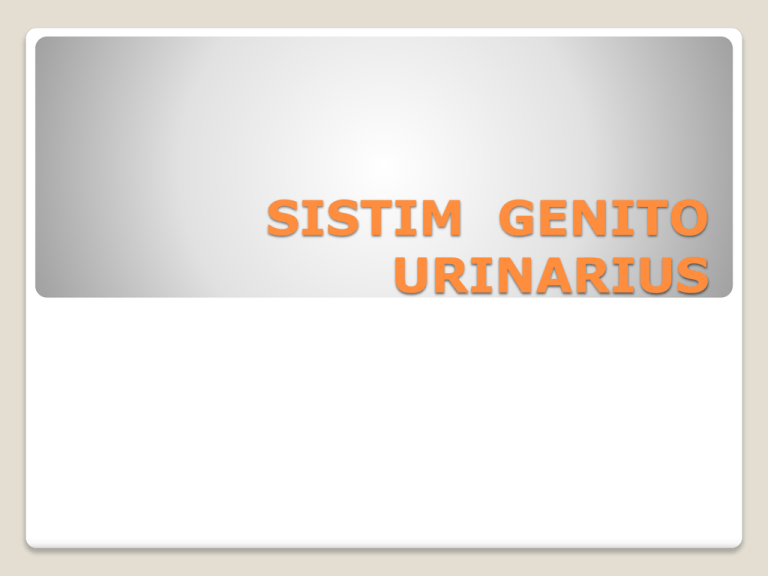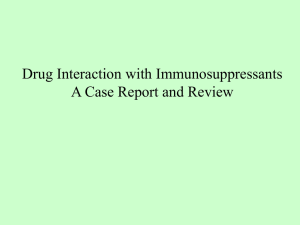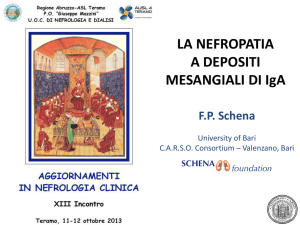
SISTIM GENITO
URINARIUS
I.FUNGSI GINJAL :
1.Mengatur keseimbangan air dan ion
inorganik
2.Mengeluarkan end produc metabolisme
3.Mengeluarkan benda asing
4.Glukoneogenesis
5.Memproduksi hormon / Enzim :
-Erythopoetin
-Renin / Enzim angiotensin
- 1-25 Dihydroxi vitamin D
PRINSIP DASAR FISIOLOGI
GINJAL
II.Struktur Ginjal Dan Sistim urinarius
-Organ retrperitoneal
-Terdiri atas cortex dan Medula
-Ginjal terdiri atas 1 million Nefron
-1 nefron terdiri atas :
-Renal Corpuscle :
=glomerulus
=Capsul Bowman
-Tubulus proximal
- Ansa Henle
-Tubuli distal
-duktus koligen
FIGURE 16–2
Basic structure of a nephron. (a)
Anatomical organization. The
macula densa is not a distinct
segment but a plaque of cells in
the ascending loop of Henle where
the loop passes between the
arterioles supplying its renal
corpuscle of origin. The outer
area of the kidney is called the
cortex and the inner the medulla.
The black arrows indicate the
direction of urine flow.
(b) Consecutive segments of the
nephron. All segments in the
screened area are parts of the
renal tubule; the terms to the
right of the brackets are commonly
used for several consecutive
segments.
FIGURE 16–3
(a) Anatomy of the renal corpuscle. Brown lines in the capillary loops indicate space between
adjoining podocytes. (b) Cross
section of the three corpuscular membranes—capillary endothelium, basement membrane, and
epithelium (podocytes) of
Bowman’s capsule. For simplicity, glomerular mesangial cells are not shown in this figure.
FIGURE 16–4
Section of a human kidney. For clarity, the nephron illustrated
to show nephron orientation is not to scale—its outline would
not be clearly visible without a microscope. The outer kidney,
which contains all the renal corpuscles, is the cortex, and the
inner kidney is the medulla. Note that in the medulla, the loops
of Henle and the collecting ducts run parallel to each other.
The medullary collecting ducts drain into the renal pelvis.
FIGURE 16–5
Anatomy of the
juxtaglomerular apparatus.
III.Proses dasar pada Ginjal :
◦ 1.Glomerulu filtrasi
◦ 2.Reabsorbsi tubuli
◦ 3.Sekresi tubuli
• Pembentukan urin hasil Filtrasi gromeruli, Reabsorbsi
dan Sekresi Tubuli :
-Pembentukan urin
=filtrasi
=Reabsorbsi
=Sekresi
FIGURE 16–6
The three basic components of renal function. This figure is
to illustrate only the directions of reabsorption and secretion,
not specific sites or order of occurrence. Depending on the
particular substance, reabsorption and secretion can occur at
various sites along the tubule.
.Kecepatan ekresi urin
GFR – Reabsorbsi + Sekresi
. FILTRASI :
-terjadi melalui memb.glomerulus
-Komposisi filtrat = plasma kecuali
tampa proten dan sel.
.Mekanisme Reabsorbsi :
-Transfort aktif
-Difusi
-Pinositosis
-Osmosis
Rabsorbsi glukosa:
@glikosa difiltrasi glomerulus-Reabsobsi Tub proks---Trans aktif
@Transfort maksimum 375 mgr/menit
@Biasanya terjadi bersamaan dengan Na
REABSORBSI Na:
@65 % reabs Na di Tub proks/25 % di
Henle
REABSORBSI KLORIDA:aktif/pasif biasanya
Bersamaan dengan Na:(65% tub proks/25
% Henle/10 % diantara tub distal-kolligen
REABSORBSI KALIUM:
-50% diserap di tub prksimal/40 % pars
ascnden L/H /10 % dukt koligen
REABSORBSI ASAM AMINO:
-semua asam amino direabsorbsi tub
proksima
REABSORBSI PROTEIN PLASMA:
-<<< protein yang filtrasi di glomerulus
-Reabsorbsi di tubuli proksimal
REABSORBSI UREA:hasil akhir metabolis
Protei di hepar.(50 % tub proksimal/40 %
urea menetap filtratdiekresikan
REABSORBSI BIKARBONAT:
@tubuli proksimal-aktif(Duk koligent<)
FUNGSI ENDOKRIN GINJAL:
@Renin
@1-25 dihidroksi vitamin D3mineralisasi tulang
@eritropoitin--merupakan respon dari iskhemia ginjal berfungsi pembentukan
sel-sel darah merah
V.Konsep Clearance Ginjal
-Kemampuan ginjal membersihkan plasma
darah dari suatu zat persatuan waktu
- Cs = Us x V
Ps
Bahan yang dipergunakan :
◦ Inulin
◦ PAH
◦ Creatinin
◦ Iotalamat radioaktif
FIGURE 16–7
Renal handling of three hypothetical substances X, Y, and Z. X is
filtered and secreted but not reabsorbed. Y is filtered, and a
fraction is then reabsorbed. Z is filtered and completely reabsorbed.
FIGURE 16–8
Forces involved in glomerular filtration. The symbol
denotes the osmotic force due to the presence of protein in
glomerular capillary plasma.
FIGURE 16–10
Example of renal handling of inulin, a substance that is
filtered by the renal corpuscles but is neither reabsorbed nor
secreted by the tubule. Therefore, the mass of inulin
excreted per unit time is equal to the mass filtered during
the same time period, and as explained in the text, the
clearance of inulin is equal to the glomerular filtration rate.
FIGURE 16–11
Control of the bladder.
Micturation
Reflex control
Voluntery control
Blader fills
Cereberal
Cortex
+
Strech reseptor
+
-
Parasymphatetic
nerve
+
Bladder
Bladder
contraction
+
Motor neuron to
external sphinter
External urethral
sphinter open when
motor neuron
inhibition
Internal urethral Sphinter
mecanically open when
bladder contraction
Urination
External urethara
sphinter remains
closed when motor
neuron is stimulated
No Urination
1.NITROGEN UREA DARAH(BUN)
Urea produk akhir metabolisme protein
dan asam amino-mengandung nitrogen
Peningkatan BUN indikasi fungsi ginjal
menurun
BUN ditentukan :
-peningkatan/penurunan asupan protein
-cedra otot
-sakit hepar
-Rasio BUN : creatinin=peny hepar
<10:1 atau > 15:1
PEMERIKSAAN
FUNGSI GINJAL
2.Creatinin N0rmal 0,7-1,5/100 cc darah
> 1,5 mgr%----ggn fungsi ginjal
Penurunan fungsi ginjal 50%2kali
Penurunan fungsi ginjal 75 %-3 kali
3.Urinalisis(makros/mikroskopis)
4.Sistoskopi :teropong uretrae VU-
melihat kelainan pada vu
5.Voiding Cystourethrography-kateterisasi
VU dan infusi perwarna radioaktif
6.Urografi intra vena--Ro serial
7.Ultrasoun ginjal-refleksi gelombang
suara identifikasi kelainan pada ginjal
PERUBAHAN FILTRASI GLOMERULUS
@Perobahan P kapiler-MAP
@Perobahan tekanan koloid osmotik
plasma--kadar protein plasma
@Perubahan tekanan koloid cairan intertitial-kadar protein c.intertitial
@Perobahan tekanan cairan intertitial
AZOTEMIA :peningkatan abnormalbahan
sisa bernitrogen dalam
darah(urea/asam urat/kretinin
KONSEP PATOFISIOLGI
UREMIA suatu sindroma pada stadim
akhir penyakit ginjal yang timbul akibat:
-asidosis
-anemia
-penumpukan semua end produc.
SINDROMA NEFROTIK:
-proteinuria > 5 gr/hari
-edema anasarka
ANASARKA:edema anasarka krn
hipoalbuminemia akibat Sindromanefrotik
sebab lain
n
OSTEODISTROFI GINJAL:demineralisasi
tulang akibat penyalit ginjal.
Sebab:-penurunan pengaktifan Vit D3 –
oleh ginjal
-penumpukkan ino pospat
-peranan tulang sebagai penyanggah H ion dalam plasma
ASIDOSIS METABOLIK(Asidosis ginjal)
adalah penurunan Ph plasma tidak
disebabkan oleh ggn pernafasan
ENSEFALOPATI UREMIK :perubahan
neurologi akibat penyakit ginjal yang
parah
DIALISIS GINJAL :adalh proses
penyesuaian kadar elektrolit dan air
dalam darah pada orang fungsi ginjal
rusak
HEMODIALISIS :dialisis yang dilakukan
diluar tubuh/dilakukan 3-5 x/minggu
DIALISIS PERITONIUM
TRANSPLANTASI GINJAL:
1.Hipospadia/epispadia
2’agenesis ginjal
3.Refluks vesiko ureter/uretrovesikal
4.Batu ginjal
5.Kandung kemih neurogenik
6.Infeksi saluran kemih
7.Glomerulonefritis
8.Mioglobin urea
9.Sindroma Uremik Hemolitik
10.Gagal ginjal akut/kronik
KEADAAN PENYAKIT /CEDRA
Adalah kelainan konggenital berupa
kelainan letak lubang uretrae dari ujung
penis ke sisi ventral /skrotum/peri
anus(dorsal penis)
KLINIS :
@.Kesulitan ketidak mampuan berkemih
secara adekwat pada posisi berdiri
@chordee biasanya menyertai hipospadia
@Hernia inguinalis/andescended testis
dapat menyertai
DIAGNOSTIK:Pemeriksaan Fisik/wawancara
HIPOSPADIA DAN EPISPADIA
KOMPLIKASI :
@disfungsi ejaklasi pada saat dewasa
@ekstrofia pemejanan melalui kulit
PENATALAKSANAAN :koreksi bedah
dilakukan sebelum anak umur 1-2 thn
AGENSIS GINJAL :kegagalan pembentukan
ginjal selama gestasi unilateral/bilateral:
KLINIK:
@bilateral agenesis ginjal(Sind Pooter)
biasanya meninggal inuterus/segera
lahir
@kompenssai ginjal yang sehat 2 X >
DIAGNOSTIK:
@ultrasound perinatal
@scan computerize axial tomogrphy(CAT)
PENTALAKSANAAN:
@bila ginjal yang ada sehat tdk
diperlukan
@Tindakan bedah
REFLUKS VESIKOURETER/URETROVISIKAL:
Adalah aliran balik urin dari vuueter
yang terjadi:kelainan
konggenital/neurogenik blader/infeksi
berulang-- jr parut
KLINIS:-infeksi saluran kemih berulang
-iritabilitas/kesulitan makan
DIAGNOSTIK:-Urografi intra vena
-sistourgrafi
KOMPLIKASI:
-obstruksi ginjal/gagal ginjal
PENATALAKSANAAN:
-Remisi spontan
-tindakkan bedah
-Antibiotika profilaks mulai saat
lahir
Adalah batu yang terdapat diamana saja pada
saluran kemih
Komponen pembentuk
batu:magnesium/amonium/asam urat/atau
komonasi
Etiologi:-peningkatan/penurunan pH urin
-diet tetentu
-stasis urin
-fk risiko peninggkatan BB
KLINIS:
-Kolik renal/asimtomatik
-hematuria/produksi urin turun
-pengenceran urin
BATU GINJAL
DIAGNOSTIK:
-pemeriksaan darah/urin
-Radiografi/urografi intra vena
KOMPLIKASI:
-Obstruksi urin
-kollaps nefron/kapilerishkemia ginjal
atau gagal ginjal.
PENATALAKSANAAN:
-banyak minum
-modifikasi diet
-perubahan pH urin
-Litotripsi/tindakan bedah
Adalah kelainan persarafan dari VU
motorik/sensori
ETIOLOGI:
-sklerosis multiple
-transeksi MS
-trauma/tumor yang mengenai khorda
spinalis
-poliomielitis/DM
KLINIS:
-inkontinensia urin
-retensi urin
KANDUNG
KEMIH
NEUROGENIK
-inkontinensia
overflow
DIAGNOSTIK:
-riwayat dan pemeriksaan
-pemeriksaan neuromuskulare
KOMPLIKASI:
-infeksi saluran kemih berulang
-Gagal ginjal kronis
PENATALAKSANAAN :
-Latiahan kosongkan VU/diisi setiap 24jam
-drainase kateter/kompresi manual VU
INFEKSI SALURAN KENCING


